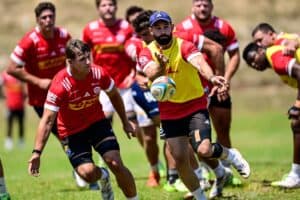The issue of return on investment in our sport will become more thorny if the socioeconomic situation does not improve drastically.

Results from the Dakar Rally and the launch of the new SA20 cricket league over the past week serve to remind South Africans that our people are quite capable of meeting, and surpassing, international standards when proper sporting, financial and marketing elements are in place.
To kick-start a year in which the Boks will defend their Rugby World Cup crown, and the country hosts the Women’s T20 Cricket World Cup and Netball World Cup, among other positives, there were men and machines from South Africa, as well as one women rider, who outperformed many rivals in the 45th edition of the gruelling Dakar Rally in Saudi Arabia.
And, while those crews from Mzansi were conquering the inhospitable desert between the Red Sea and Persian Gulf, Cricket South Africa successfully brought to life its own T20 league on its third attempt, with performers Master KG and Sho Madjozi headlining the razzmatazz at the launch in Cape Town on January 10.
ALSO READ | South Africans raise the bar as Al-Attiyah wins 45th Dakar Rally
As T20 commissioner Graeme Smith said about the new competition: “It’s an opportunity for people to enjoy warm summer evenings and competitive cricket, coupled with off-field entertainment and activities for young and old.”
However, since sport cannot be divorced from life, all concerned will have to hope that the economic situation in our land makes magical leaps forward in the coming years, otherwise sport will also be a victim.
READ MORE
Pietermaritzburg-based Tuskers eye elite league
Notably, the most successful SA team in the rally was backed by Toyota of Japan, even though its Hilux vehicles were constructed in this country. Several other local outfits that competed had international ties that made their participation possible.
Because successful countries tend to produce successful sportspeople and competitions, there could be a dwindling of much-needed commercial support for sport in South Africa should the economic situation not improve.
The forecast for growth has been downgraded again, half of our population is surviving on grants, and less than 12% are registered taxpayers.
This is scary stuff and only the naive will say the sporting community has nothing to worry about.
When you consider that South Africa’s positive results in the world’s toughest race, the Dakar Rally, and the creation of the SA20 cricket competition, came about with strategic partnerships and financial support from international businesses, then the issue of return on investment in our sport is going to become thornier should the socioeconomic situation not improve drastically.
ALSO READ | Another strong run from Loeb
Notably, the most successful SA team in the rally was backed by Toyota of Japan, even though its Hilux vehicles were constructed in this country.
Several other local outfits that competed had international ties that made their participation possible.
And the SA20 launch would not have been possible without investors from India. It’s not hard to imagine that these ties will continue to benefit all concerned for as long as there’s a return on investment.
There were several drivers, co-drivers and riders from SA who were generally pleased with their performances at the end of the rally on Sunday.
They had conquered around 8 000 kilometres of sand, dunes and rocks under a baking sun, and gone through several unusual flash floods, over a two-week period in the desert kingdom.
An impressive number of wholly or partly SA-manufactured vehicles were used by them, including Toyotas, Audis and Nissans.
At the end of it, there were four “Proudly South African” Hiluxes and two South African drivers, Giniel de Villiers and Henk Lategan, sitting among the top five positions overall in the car division.
ALSO READ | Al-Attiyah the man to beat as Loeb wins stage
Five SA riders finished the contest, with Michael Docherty the top rookie in the bike division, Charan Moore the quickest in the self-assisted class, and Kirsten Landman the only female in that same difficult class.
The first African woman to finish the Dakar in 2020, Landman was declared a “Dakar Hero” for helping fellow rider Mishal Al Ghuneim from Saudi Arabia when he suffered injuries to both legs during a crash. She arrived on the scene and was able to radio for a helicopter.
She insisted on waiting with Al Ghuneim until he was safely loaded into the helicopter during Stage 4 of the rally. The spirit of ubuntu in the hellish desert!
Aluta continua!
• Carl Peters is the sports editor at The Witness.






